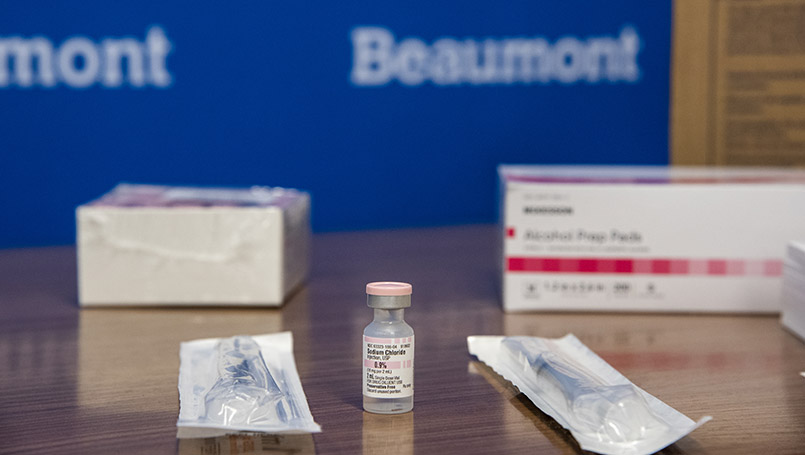
Beaumont experts help set the record straight on some common COVID-19 vaccine myths that can undermine the science and research that went into the development.
Here are some common coronavirus vaccine myths and the truth behind each:
Myth: The vaccine was rushed, so it’s probably not safe.
Fact: The United States Food and Drug Administration closely monitored research by Pfizer and Moderna as the two companies worked toward a vaccine. The research suggests both vaccines have very little, if any, side effects, and is approximately 95% effective.
Additionally, the FDA has rigorous scientific and regulatory processes in place to facilitate development and ensure the safety, effectiveness and quality of COVID-19 vaccines.
In addition, Beaumont Health established a Vaccine Review Subcommittee comprised of experts in Infection Prevention, Research, Nursing and Pharmacy that will review all available data and make a recommendation to the Vaccine Steering Committee about proceeding to offer vaccine to employees, physicians and the community. Beaumont is committed to ensuring any vaccine provided to employees and the community is deemed safe by our expert panel.
Myth: Delays or pauses in the process meant trials weren’t going well.
Fact: Every scientific process, including creating vaccines, can have pauses or delays, but it doesn’t mean trials aren’t going well. Pauses or delays mean the safety system in place is working as it should, which is reassuring.
Earlier this year, Johnson & Johnson and AstraZeneca paused COVID-19 vaccination clinical trials in an overabundance of caution for the safety of volunteers. They have since resumed the trials.
Myth: I don’t want the COVID-19 virus injected into my body.
Fact: The COVID-19 vaccine does not use dead or weakened strains of coronavirus. mRNA vaccines from Pfizer and Moderna are a new type of vaccine to protect against infectious diseases. To trigger an immune response, many vaccines put a weakened or inactivated germ into our bodies. Not mRNA vaccines. Instead, they teach our cells how to make a protein—or even just a piece of a protein—that triggers an immune response inside our bodies. That immune response, which produces antibodies, is what protects us from getting infected if the real COVID-19 virus enters our bodies.
Myth: It’s safe for me to get vaccinated, but not my family. I don’t want the vaccine to get my family sick.
Fact: Receiving a vaccine will not make other people sick. Additionally, because the COVID-19 vaccination does not use any form of the virus, either in a dead or weakened state, any risk which might have been a possibility in transmitting COVID-19 to family or friends is not plausible.
Myth: I’ll get the first round of vaccine, but I won’t need the second.
Fact: There are some viruses and some bacteria that we vaccinate against and one dose of the vaccine just doesn't provide full immunity to prevent illness. Priming your immune system with the first dose allows it to react to it once, create some memory and then when you get exposed to it a second time through the second vaccination, it really develops that full, long-term memory.
Myth: If I get vaccinated for COVID-19, I’ll be more vulnerable to illnesses.
Fact: While the COVID-19 vaccine will work to teach your immune system to recognize and protect against coronavirus, it is not proven to make you vulnerable to other illnesses. You may experience the typical sore arm, slight fever or aches, but that’s a sign your immune system is active and getting ready to protect you against COVID-19, if necessary.
Myth: Because vaccines are available, the pandemic is over.
According to the CDC, while experts learn more about the protection COVID-19 vaccines provide under real-life conditions, it will be important for everyone to continue using all the tools available to us to help stop this pandemic, like covering your mouth and nose with a mask, washing hands often, and staying at least six feet away from others. Together, COVID-19 vaccination and following CDC’s recommendations for how to protect yourself and others will offer the best protection from getting and spreading COVID-19.
Experts need to understand more about the protection that COVID-19 vaccines provide before deciding to change recommendations on steps everyone should take to slow the spread of the virus that causes COVID-19. Other factors, including how many people get vaccinated and how the virus is spreading in communities, will also affect this decision.
Myth: The vaccine changes your DNA.
Fact: The vaccine does not change your DNA. It’s called an mRNA vaccine, which is a type of vaccine that causes your cells to make an inactive part of virus that triggers an immune response. That immune response is what protects us from getting infected if the real COVID-19 virus enters our bodies.
NEXT STEPS AND HELPFUL RESOURCES
- Beaumont HouseCall Podcast: First COVID Vaccine
- COVID-19 Vaccine FAQs
- Are the COVID-19 vaccines safe?
